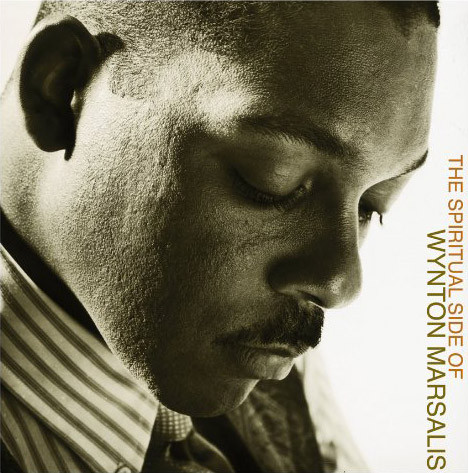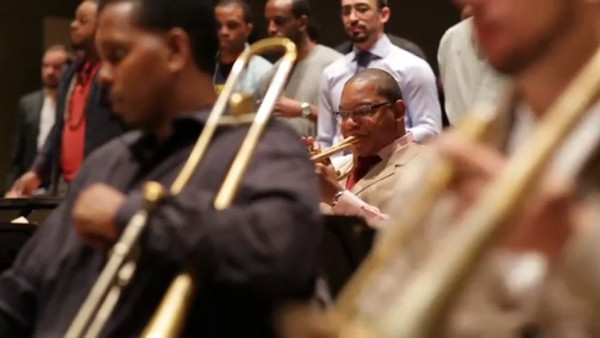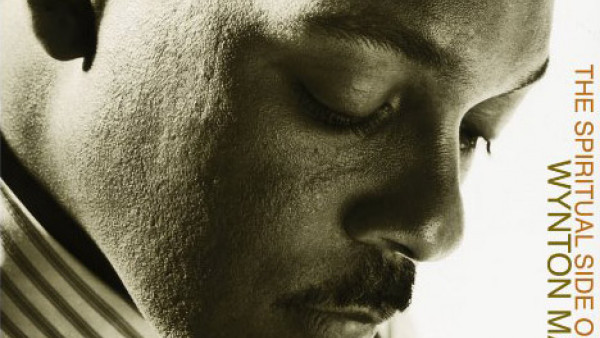The Spiritual Side of Wynton Marsalis
The Spiritual Side of Wynton Marsalis has a central artistic theme. It alternates slow and fast numbers, a repetition which represents the New Orleans funeral function – sorrowful but ultimately uplifting. From a single plaintive chant, to an instrumental reenactment of a Sunday service, to a full choir shouting for redemption, this new release is designed to celebrate our collective soul. We are uplifted by Marsalis’ supreme love for artistic excellence and that most pervasive of consciousnesses, the spirit. ALL RISE.

Album Info
| Ensemble | Multiple Ensembles |
|---|---|
| Release Date | October 22nd, 2013 |
| Record Label | Columbia/Legacy |
| Catalogue Number | 88883 78542 2 |
| Formats | CD, Digital Download |
| Genre | Jazz Recordings |
Track Listing
| Track | Length | Preview |
|---|---|---|
| I Hear a Knockin’ – from: Reeltime | 0:52 | Play |
| All Rise: XII: I Am (Don’t You Run From Me) – from: All Rise | 2:53 | Play |
| If I Hold On – from: Reeltime | 1:40 | Play |
| Processional – from: In This House, On This Morning | 7:15 | Play |
| Psalm 26 – from: Uptown Ruler (Soul Gestures In Southern Blue Vol. 2) | 1:28 | Play |
| Awakening – from: Sweet Release & Ghost Story | 2:17 | Play |
| Hymn – from: In This House, On This Morning | 5:56 | Play |
| Precious Lord, Take My Hand – |
6:22 | Play |
| In the Sweet Embrace of Life Sermon: Holy Ghost – from: In This House, On This Morning | 6:56 | Play |
| Flee as a Bird to the Mountain – from: Live at the Village Vanguard | 3:13 | Play |
| Sing On – from: Reeltime | 2:49 | Play |
| Benediction – from: In This House, On This Morning | 5:25 | Play |
| Oh We Have a Friend in Jesus – from: Blood On the Fields | 4:07 | Play |
| To Higher Ground – from: Reeltime | 4:49 | Play |
| Pot Blessed Dinner – from: In This House, On This Morning | 4:00 | Play |
Liner Notes
Spirituality is a holistic philosophy that strikes a balance between the sacred and secular worlds. In jazz, the sound of this balance is epitomized by John Coltrane’s landmark album, A Love Supreme. The liner notes begin, “With love to all, I thank you.” Although this recording was addressed to a merciful God, his inspiration came from his lived experiences. Coltrane’s struggles with substance abuse added weight to his return to spirituality and his call to God for redemption spoke to the social struggles of 1960s America – a country that was fractured by the challenges of reconciling an ideology of universal freedom with the condition of her previously enslaved people.
It was this America that shaped jazz, and it was this America that Wynton Marsalis was born into in 1961. The son of a jazz musician, he remembered the impact of A Love Supreme, released in February of 1965. “My father and his friends were inspired by Coltrane. They had deeply held beliefs, some of which were counter to Christian teachings, so they were not churchgoers per se, but they loved Trane, and would speak of the integrity in his music. They were always reaching for a deeper spirituality. A good number of these men were Muslims, others didn’t identify with any organized tradition, but almost all of them quoted scripture as the final word for jokes, arguments or somber truths.”
Marsalis’ growth was grounded in Christian philosophy by his mother, and by his great aunt and uncle, Marguerite and Alphonse Lambert. Born in 1883, Alphonse was a stone cutter and an engraver for the cemeteries. He was also a Christian without denomination. “His proximity to death and the dead gave him a practical, albeit philosophical, spirituality,” Marsalis said. These teachings and the lessons he learned about soul while listening to his father and the other jazz musicians talk, taught him how to accept the spirit in its many forms.
After Martin Luther King Jr. was assassinated in 1968, Marsalis’ parents decided to enroll their children in a previously all-white Catholic school in Kenner, Louisiana, Our Lady of Perpetual Health. There, catechism classes were mandatory. He loved the stories and teachings of both Testaments. However, the de facto segregated status of the Catholic Church in his town made it impossible for him to completely embrace the experience, and he often refused to attend Mass on Sundays. As a teen, his spirituality grew outside the confines of the church. Perhaps that’s why the sermon section of his 1992 Mass, In This House, On This Morning, is entitled “In the Sweet Embrace of Life.”
Marsalis has embraced the sanctity of worldliness throughout his career. In his 2011 Harvard University lecture, “Music as Metaphor,” he states, “the struggle at the heart of humankind and the central debate of our constitution has been resolved by (American) musical arts for over a century.” It lifts us out of the human problem of “Me vs. You” and “Us vs. Y’all,” and brings us to the understanding – “All of Us.”
Marsalis’ philosophy on music is steeped in optimism because he believes that the human spirit is irrepressible. “Spiritual,” he says, “means the innermost reflections on the most high and on an all-pervasive consciousness. It is a basic warmth and acceptance of human beings in the glory of unruly humanness.” He communicates this understanding through an integrated sound informed by the blues and the New Orleans tradition. You will find this spirit in every phrase of his recordings. It rings out in Jeremiah Wright’s reading of Stanley Crouch’s sermon on The Majesty of the Blues. This same spirit informs the social messages in his later works such as From the Plantation to the Penitentiary and He and She – it’s even in the piercing sound of his trumpet, crying out over Charnett Moffett, Kenny Kirkland and Jeff “Tain” Watts on Black Codes (From the Underground).
This latest release is collected from seven previously recorded albums. It also features an unreleased treasure, “Precious Lord, Take My Hand,” sung by gospel legend Marion Williams, with the masterful Eric Reed on piano. Ms. Williams sang this impromptu gift during the recording session for In This House, On This Morning for the members of the septet. According to Marsalis, she said “I am so impressed with all these young men, playing so well and being so wonderful to me.” The musicians were all so deeply moved that 20 years after the initial recording session Marsalis remembered that it was still in the Sony vaults.
The tracks “I Hear a Knockin,’” “If I Hold On,” “Sing On,” and “To Higher Ground” have been selected from the CD Reeltime. This recording was a score for John Singleton’s film Rosewood, but it was not used in the final cut. According to Marsalis, the chief focus of this music was to “… give the listeners an accurate rendering of the visceral experience of small town southern music in the early 20th century, the variety of people and the intensity of their relationships.”
“Hymn,” “Processional,” “Holy Ghost,” “Benediction,” “Pot Blessed Dinner,” and “Precious Lord, Take My Hand” are from Marsalis’ first commissioned work for Jazz at Lincoln Center, In This House, On This Morning. It is a Mass in the form of a typical Afro-American church service. In 1992 pianist and former band-mate Marcus Roberts said of this composition, “… The first thing I find remarkable about it is that somebody who didn’t grow up attending regular Baptist church services could capture so authentically the feeling of that experience.” Marsalis developed that feeling through the “church” of American life in the South.
“Flee as a Bird to the Mountain” is a song that Wynton recorded with his septet at the Village Vanguard. Every December from the late ’80s to the mid ’90s, the septet played the Vanguard and would record every set. “The audiences loved the informal but structured way we played,” he said. “Performing in the most sacred of jazz’s clubs inspired us to play with a particular exuberance and depth.”
“Awakening” is from the ballet, Ghost Story, written for Chinese dancer and choreographer Zhong Mei Li. This piece tells the tale of a woman caught between the living world and the spirit realm. It, as well as Li’s choreography, pulls inspiration from Buddhist teachings about the cycle of life. Marsalis finds the blues relationship through the pentatonic scale and the bending of tones with yin and yang intentions.
“Oh We Have a Friend in Jesus” is from the Pulitzer Prize winning oratorio on American slavery, Blood on the Fields. Cassandra Wilson channels the hopes and cries of a slave woman finding liberation, through giving love, despite being spurned by the subject of her affection.
Finally, “Psalm 26” is a part of his 1991 album Uptown Ruler. The Uptown Ruler is a mythical figure from Mardi Gras lore who Marsalis describes as being “…accepted without question in the houses of worship, institutions of higher discourse and intellectual engagement, as well as places of ill repute and lower levels of social intercourse.” This selection, a duet of trumpet, is an introspective modern hymn.
Though a compilation, The Spiritual Side of Wynton Marsalis has a central artistic theme. It alternates slow and fast numbers, a repetition which represents the New Orleans funeral function – sorrowful but ultimately uplifting. From a single plaintive chant, to an instrumental reenactment of a Sunday service, to a full choir shouting for redemption, this new release is designed to celebrate our collective soul. We are uplifted by Marsalis’ supreme love for artistic excellence and that most pervasive of consciousnesses, the spirit. ALL RISE.
ELATION-ELEGANCE-EXALTATION:
Wynton Marsalis’ spiritual side
Written by Simeon Marsalis
Credits
1. I Hear a Knockin’ (solo) (:52)
(W. Marsalis)
Shirley Caesar, vocalist
Recorded September, 1996
Produced by Delfeayo Marsalis
Shirley Caesar appears courtesy of Word Records
From Reeltime (SK 51239), rel. 10/29/99
℗ 1999 Sony Music Entertainment
2. All Rise: XII: I Am (Don’t You Run From Me) (edit) (2:43)
(W. Marsalis)
Wynton Marsalis, trumpet
The Paul Smith Singers
The Northridge Singers of California State University at Northbridge
(Dr. Paul Smith, director)
Morgan State University Choir
(Dr. Nathan Carter, director)
The Lincoln Center Jazz Orchestra
The Los Angeles Philharmonic
(Esa-Pekka Salonen, conductor)
Ted Nash, flute
Jason Marsalis, drums
Vocal soloist Cynthia Hardy
Recorded September 14, 2001
Produced by Steve Epstein
From All Rise (S2K 89817) rel. 10/1/02
℗ 2002 Sony Music Entertainment
3. If I Hold On (1:38)
(W. Marsalis)
Shirley Caesar, vocalist
Eric Reed, piano
Recorded September, 1996
Produced by Delfeayo Marsalis
Shirley Caesar appears courtesy of Word Records
Eric Reed appears courtesy of Verve Music Group
from Reeltime (SK 51239), rel. 10/29/99
℗ 1999 Sony Music Entertainment
4. Processional (4:35)
(W. Marsalis)
Wynton Marsalis Septet
Wynton Marsalis, trumpet
Wycliffe Gordon, trombone
Wessell Anderson, alto sax
Todd Williams, tenor sax, soprano sax
Eric Reed, piano
Reginald Veal, bass
Herlin Riley, drums
Recorded May 28-29, 1992 and March 20-21, 1993
Produced by Steve Epstein
From In This House, On This Morning (C2K 53220), rel. 3/22/94
℗ 1994 Columbia Records, a division of Sony Music Entertainment
5. Psalm 26 (1:35)
(W. Marsalis)
Wynton Marsalis, trumpet
Marcus Roberts, piano
Reginald Veal, bass
Recorded February 24, 1988
Produced by Steve Epstein
From Uptown Ruler – Soul Gesture Vol. 2 (CK 47976), rel. 7/91
℗ 1991 Columbia Records, a division of Sony Music Entertainment
6. Awakening (2:17)
(W. Marsalis)
Wynton Marsalis, trumpet, conductor
Ted Nash, alto & soprano sax, flute
Eric Lewis, piano
Carlito Henriquez, bass
Jaz Sawyer, drums
Recorded December 7, 1998
Produced by Delfeayo Marsalis
Ted Nash appears courtesy of Arabesque Records
From Sweet Release & Ghost Story (SK 61690), rel. 8/10/99
℗ 1999 Sony Music Entertainment
7. Hymn (3:56)
(W. Marsalis)
Personnel same as track #2
Recorded May 28-29, 1992 and March 20-21, 1993
Produced by Steve Epstein
From In This House, On This Morning (C2K 53220), rel. 3/22/94
℗ 1994 Columbia Records, a division of Sony Music Entertainment
8. Precious Lord, Take My Hand (6:24)
(T. A. Dorsey)
Marion Williams, vocal
Eric Reed, piano
Recorded March 21, 1993
Produced by Steve Epstein
Marion Williams appears courtesy of Shanachie/Spirit Feel Records
Recorded during sessions for the album, In This House, On This Morning
Previously Unreleased
℗ 2013 Columbia Records, a division of Sony Music Entertainment
9. In the Sweet Embrace of Life Sermon: Holy Ghost (6:56)
(W. Marsalis)
Personnel same as track #2
Recorded March 20-21, 1993
Produced by Steve Epstein
From In This House, On This Morning (C2K 53220), rel. 3/22/94
℗ 1994 Columbia Records, a division of Sony Music Entertainment
10. Flee as a Bird to the Mountain (3:12)
(trad.)
Wynton Marsalis Septet
Wynton Marsalis, trumpet
Wessell Anderson, alto sax
Victor Goines, tenor & soprano sax, clarinet
Michael White, clarinet
Wycliffe Gordon, trombone
Eric Reed, piano
Reginald Veal, bass
Herlin Riley, drums
Recorded 1990 – 1994
Produced by Steve Epstein
Wessell Anderson is a Leaning House Artist
Victor Goines appears courtesy of Rosemary Joseph Records
Wycliffe Gordon appears courtesy of Nagel-Hayer Records
Eric Reed appears courtesy of Verve Music Group
From Live at the Village Vanguard (CXK 69876), rel. 12/7/99
℗ 1999 Columbia Records, a division of Sony Music Entertainment
11. Sing On (2:47)
(trad.)
Wynton Marsalis, trumpet
Michael White, clarinet
Wess “Warmdaddy” Anderson, alto sax
Victor Goines, tenor sax
Ron Westray, Delfeayo Marsalis, trombones
Don Vappie, banjo
Wycliffe Gordon, tuba
Reginald Veal, bass
Herlin Riley, drums
Recorded September 1996
Produced by Delfeayo Marsalis
Wess “Warmdaddy” Anderson is a Leaning House Records artist
Don Vappie appears courtesy of Vappielle Records
From Reeltime (SK 51239), rel. 11/2/99
℗ 1999 Columbia Records, a division of Sony Music Entertainment
12. Benediction (3:26)
(W. Marsalis)
Personnel same as track #2
Recorded March 20-21, 1993
Produced by Steve Epstein
From In This House, On This Morning (C2K 53220), rel. 3/22/94
℗ 1994 Columbia Records, a division of Sony Music Entertainment
13. Oh We Have A Friend in Jesus (4:07)
(W. Marsalis)
Cassandra Wilson, vocal
Eric Reed, piano
Recorded January 22-25, 1995
Produced by Steve Epstein
From Blood on the Fields (CK 57694) rel. 6/97
℗ 1997 Columbia Records, a division of Sony Music Entertainment
14. To Higher Ground (4:46)
(W. Marsalis)
Big band conducted by Wynton Marsalis
Choir conducted by Byron J. Smith
Wynton Marsalis, Marcus Printup, Roger Ingram,
Oscar Brashear, Bob Findley, Russell Gunn, Jamil Sharif, trumpets
Wessell “Warmdaddy” Anderson, also sax, clarinet
Sherman Irby, alto sax, clarinet
Gideon Feldstein, baritone sax, bass clarinet
Victor Goines, clarinet, bass clarinet, tenor sax
Stephen Riley, tenor sax
Wycliffe Gordon, Ron Westray, Vincent Gardner, Bill Reichenbach, trombones
Eric Reed, piano
Reginald Veal, bass
Herlin Riley, drums, tambourine
Kimati Dinizulu, percussion
Stefon Harris, vibraphones, marimba, percussion
Russell Malone, guitar
Recorded September, 1996
Produced by Delfeayo Marsalis
From Reeltime (SK 51239), rel. 10/29/99
℗ 1999 Columbia Records, a division of Sony Music Entertainment
15. Pot Blessed Dinner (2:40)
(W. Marsalis)
Personnel same as track #2
Recorded March 20-21, 1993
Produced by Steve Epstein
From In This House, On This Morning (C2K 53220), rel. 3/22/94
℗ 1994 Columbia Records, a division of Sony Music Entertainment
Original recordings produced by Steve Epstein and Delfeayo Marsalis
Compilation Produced by Wynton Marsalis and Nedra Olds-Neal
Supervised for CD by Nedra Olds-Neal
Mastered by Mark Wilder at Battery Studios, NYC 2013
Product Direction: Nell Mulderry
Art Direction and Design: Frank Harkins
Photography: Michael Llewelyn; Inside tray photograph: Luigi Beverelli
Personnel
- Paul Smith Singers – vocals
- Morgan State Choir – vocals
- The Northridge Singers of California State University at Northridge – choir
- Esa-Pekka Salonen – conductor
- Ted Nash – alto sax, soprano sax, clarinet, flute, piccolo
- Jason Marsalis – drums
- Eric Reed – piano
- Wycliffe Gordon – trombone
- Wess “Warmdaddy” Anderson – alto sax, sopranino sax
- Todd Williams – tenor sax, soprano sax
- Reginald Veal – bass
- Herlin Riley – drums, tambourine
- Marcus Roberts – piano
- Eric Lewis – piano
- Carlos Henriquez – bass
- Jaz Sawyer – drums
- Marion Williams – vocals
- Victor Goines – tenor sax, soprano sax, clarinet, bass clarinet
- Dr. Michael White – clarinet
- Ron Westray – trombone
- Delfeayo Marsalis – trombone
- Don Vappie – banjo, guitar
- Cassandra Wilson – vocals
- Roger Ingram – trumpet
- Marcus Printup – trumpet
- Russell Gunn – trumpet
- Jamil Sharif – trumpet
- Sherman Irby – alto sax, soprano sax, clarinet, flute
- Gideon Feldstein – baritone sax, bass clarinet
- Stephen Riley – tenor sax
- Stefon Harris – vibraphone
- Oscar Brashear – trumpet
- Kimati Dinizulu – percussion
- Russell Malone – guitar
- Shirley Caesar – vocals
- Bob Findley – trumpet
- Bill Reichenbach – trombone



